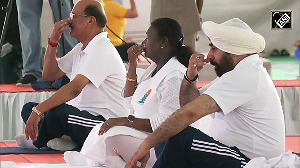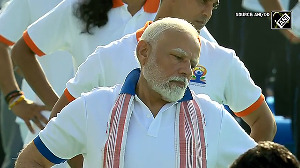When the very mention of the word 'Kamasutra' may raise many eyebrows, a school in Florida, US, has made it a part of its vocabulary in history textbooks -- to the chagrin of many parents.
Of the many literary texts India has produced, Kamasutra has found a special mention in the vocabulary syllabus of Gateway Charter school in Lee County, reports the web site abc-7.com.
'That's just one of those things you learn as you go through life. It's not that anybody sits down and says, 'Hey this is Kamasutra. Let me teach you about it',' a parent, Shane Driscoll, has been quoted as saying by the web site.
Kamasutra, the Indian literary text of the third century written by scholar Vatsyayana, is considered to be the standard work on human sexual behavior in Sanskrit literature.
However, the school has justified its stand saying the word has been approved by the Advanced Placement -- a programme offering college-level offers courses at high schools across the US -- and its reference to the text is just as a part of Indian literary history.
The school has been teaching the word as part of an AP course on world civilisations. Gateway Charter officials said the textbook and vocabulary list are AP regulated on a national scale.
However, parents are not satisfied with the explanation and want the word removed from the texts.
'It has no place in the classroom -- especially if the parents aren't aware that the subject is being broached,' said Driscoll.
Gateway Charter Principal Joe Roles issued a statement that said: 'It is our responsibility to teach the approved curriculum in the context in which it is presented.'
Renga Sunderesan, president of the Hindu Temple of Southwest Florida, said the text has attained distorted reference over time, whereas it was originally written with a spiritual connotation.
'That piece of literature has attracted worldwide attention,' he said.
He said the book laid out basic rules of love and marriage per Hindu law -- including the spirituality of lovemaking.
However, the text is today mostly mentioned only in an erotic sense.
A class X student Elijah Hayter said he was already familiar with the term: 'It's the book of all the different sexual positions.'
Most parents found the mention of the word in the school textbook unnecessary, as Driscoll said. 'In return we want you to understand that while this is a college class, you are teaching it to 15-year-old-students.'





